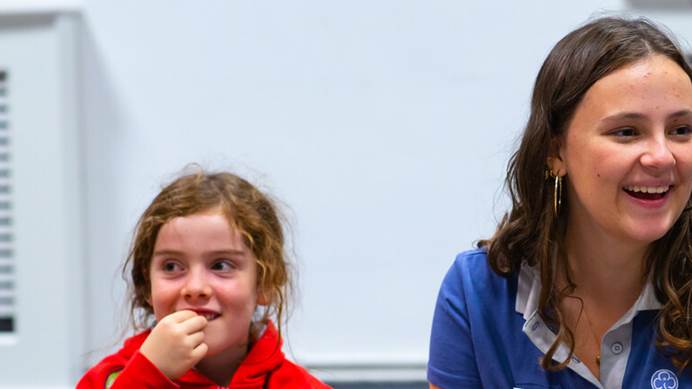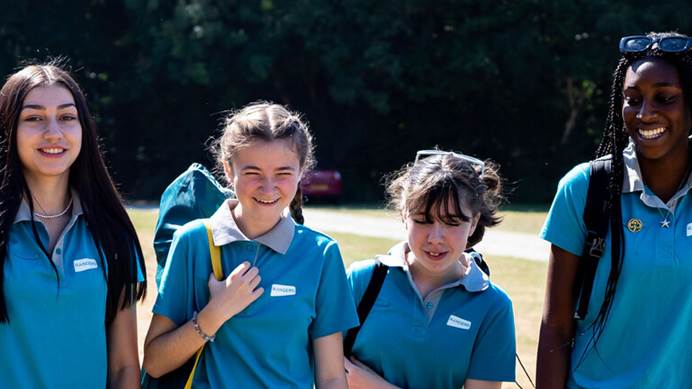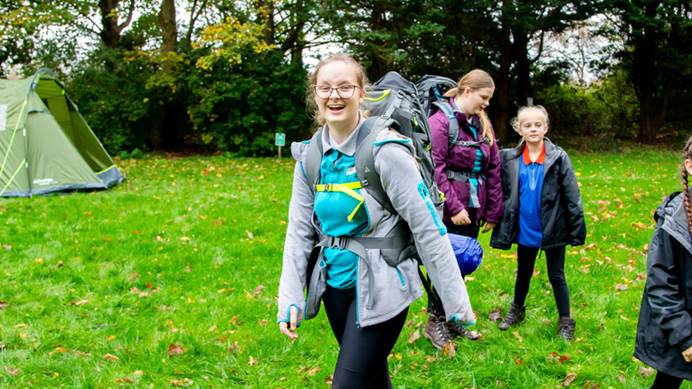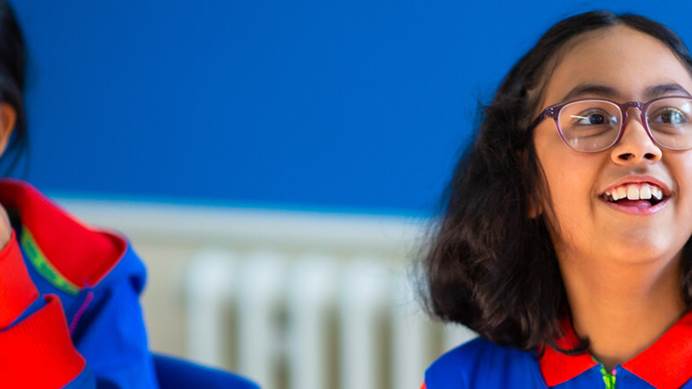Guiding-inspired experiences
Experiences that bring the benefits of guiding to a wider range of girls
Girls are in crisis, with 85% experiencing sexism in their daily lives.
Rising misogyny online, in public and in schools is making girls less safe. Girls are also feeling less confident as a result.
Girlguiding is committed to supporting the government in its bold goal of halving violence against women and girls in the next 10 years.
As experts in girls’ lives, we're funding pilot projects to bring 'guiding-inspired' experiences to girls outside of traditional guiding. These experiences range in age and focus, but the aim is to bring the impact of our core programme to a wider range of girls. Our goal is to help set up young people for healthy relationships, develop their confidence and leadership skills, and empower them to follow careers in STEM (science, technology, engineering and mathematics).
Here are some of the guiding-inspired experiences we've been bringing to girls so far.
NCS (National Citizen Service) Guiding Reach
NCS Guiding Reach provides extra-curricular opportunities for girls at 2 schools in Bradford. Girls who are traditionally less represented in guiding are given the chance to develop the same leadership skills and confidence boost as our core programme.
The schools involved are part of the Dixons Academy Trust. Both have majority Muslim students and serve some of the most deprived postcodes in England.
The project is delivered in weekly sessions by a teacher employed by the Trust. This allows the students to benefit without adding to the workload of existing teachers at the schools. Sessions have been running since November 2023, giving students the chance to lead their own research projects and develop their skills. They've covered topics including hijab alopecia and women’s rights across different cultures.
We're also piloting a ‘Rainbow club’ in the school, delivering after-school activities to girls aged 4-6. The club is run with volunteers aged 16-17, helping them to build leadership skills and experience. Through this project, we've directly impacted young women identified as having ‘challenging behaviour’ in school, helping them to benefit from the responsibility of looking after young children. Our case study on this page shows 1 example of the positive impact of this programme.
Project impact and next steps
We've reached 90% of girls in the school, with 200 students taking part in NCS Guiding Reach. Over 120 girls have completed a full project, giving them practical experience of leadership, as well as research opportunities that will help them when they apply to university. Almost everyone who completes 1 project goes on to complete more activities aimed at expanding their skills and ambitions.
The project has also changed the way the school provides extra-curricular activities, inspiring them to become more girl-focused and tailored to girls' experiences and needs.
The future - building on NCS Guiding Reach
Girlguiding is collaborating with Dixons Academy Trust to pilot new enrichment offers based around key issues for girls. This will be for younger age groups, focusing on attendance, attainment, and mental health.
This year, we plan to pilot several projects in different areas. We'll start with an enrichment offer in a Liverpool school, supporting girls who have poor attendance due to safety concerns, low self-esteem, or anxiety. Using Girlguiding principles, we'll help girls to understand and address the barriers they face. These new pilots are the next phase in exploring a broader Trust-wide partnership, offering various kinds of support to meet schools’ strategic goals and girls’ needs.
Guiding Equality
The goal of this project is to empower young people to express themselves in a healthy way, build a fairer, safer UK and, ultimately, to reduce gender-based violence. The programme is led by peer educators, using the strength of our girl-only spaces combined with parallel discussions about healthy masculinity with boys. Our work in this area will go beyond the formal classroom environment, so we can develop safe spaces where issues like consent, early warning signs for abuse, and healthy relationships can be discussed in a frank and engaging way.
During the pilot delivery, over twice the number of students wanted to take action on sexism and misogyny in their schools at the end of the 3rd session than the 1st.
Across all 3 modules, at least 70% of girls and boys met each of the learning objectives, with as many as 90% meeting some of the objectives. Knowledge and understanding increased consistently across the modules.
We believe this work complements age-appropriate and inclusive RHSE (relationships, health and sex education) delivered by teachers. It also challenges misogynistic attitudes which could lead to unhealthy and possibly violent relationships later in life.
Case study: Rainbows Leaders after-school club
Background
Rainbows Leaders is an after-school club designed to help students aged 16-17 build leadership, teamwork, and enjoy positive interactions with young girls aged 5-6. It provides an environment where students can grow their confidence, develop leadership skills, and take responsibility in a safe and supportive setting.
Student profile
Before joining the Rainbows Leaders after-school club, this student had a history of challenging behaviour. Staff were made aware of these concerns before the student joined. In spite of these concerns, the student has risen to the occasion, surpassing all expectations.
Progress and development
Since joining the club, the student has attended 3 sessions. Over this short period, she has shown a dramatic improvement in many areas:
- Leadership skills. The student has consistently volunteered to take the lead in organising and running activities. She actively initiates games and engages everyone taking part, including younger children, with enthusiasm.
- Role model behaviour. The student has become a positive role model for her peers and the younger children in the club. Her behaviour has been excellent, showing kindness, patience, and responsibility. She helps guide and mentor the younger members, ensuring everyone feels included and supported.
- Confidence growth. At first the student was more reserved, but she now approaches tasks with excitement and energy.
- Positive social engagement. Both her peers and the younger children look forward to seeing her each session, and she is equally excited to take part. Her positive engagement has fostered a friendly and welcoming environment at the club.
- Impact on the club. The student's progress has had a broader positive impact on the after-school club. Her leadership and role model behaviour have helped to create a more inclusive and fun atmosphere. Younger children benefit from her guidance, and her peers are encouraged to follow her example.
Conclusion
The case of this student highlights the importance of providing opportunities for leadership and structured social interaction in after-school programs. Despite a history of challenging behaviour, she's proven that with the right support and opportunities, students can thrive and exceed expectations. The Rainbows Leaders after-school club has been a vital platform for her personal growth, leadership development, and confidence-building.
This shows how every student has potential when given the opportunity to grow in a nurturing environment.
The student got stuck into the Rainbows club straight away, working well with the smaller groups of girls. She was able to help them appropriately and has been really polite in all her interaction with adults involved in the club. Although it's only the 3rd week of the club, she was confident to take the lead in a game this week and made it fun and enjoyable for the girls.” - School leader



